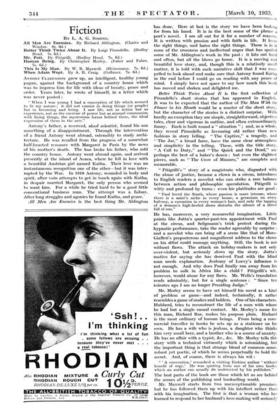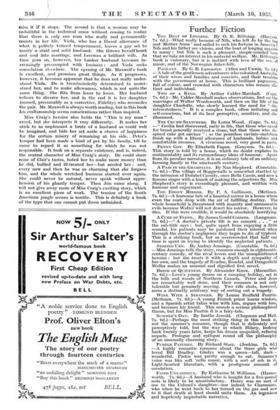Fiction
By L. A. G. STRONG.
ANTONY CLARENDON grew up, an intelligent, healthy young pagan, against the background of a country house which was to impress him for life with ideas of beauty, peace and order. Years later, he wrote of himself, in a letter which
was never posted : ' " When I was young I had a conception of life which seemed to fit my nature ; it did not consist in doing things (or people) but in becoming and being. I saw life, not as action but as experience, not as the exercise of power but as sensual communion with living things, the mysterious forces behind them, the ideal expression of them in the arts."
Antony's father, a reserved, aloof scientist, found his son something of a disappointment. Through the intervention of a friend Antony went abroad, ostensibly to study archi- tecture. He was recalled from the progress of a somewhat half-hearted romance with Margaret in Paris by the news of his mother's death. The loss broke his father, who sold the country house. Antony went abroad again, and arrived presently at the island of Aeaea, where he fell in love with a beautiful Austrian girl named Katha. Their love was an instantaneous recognition one of the other—but it was inter- rupted by the War. In 1919 Antony, wounded in body and spirit, after vain attempts to get in touch again with Katha, in despair married Margaret, the only person who seemed to want him. For a while he tried hard to be a good little conventional business man. The attempt was a failure. After long struggles and agonies he found Katha, and peace. All Men Are Enemies is the best thing Mr. Aldington has done. Here at last is the story we have been looking for, from his hand. It is in the best sense of the phrase a poet's novel. I am all out for it for a number of reasons. It is written with passion and with _faith in life. it loves the right things, and hates the right things. There is in it none of the crossness and ineffectual anger that has spoiled some of Mr. Aldington's work in the past : it hits out hard and often, but all the blows go home. It is a moving and beautiful love story, and, though this is a relatively small matter, it is told with such narrative skill that I was com- pelled to look ahead and make sure that Antony found Katha in the end before I could go on reading with any peace of mind. I simply have not space to say how much this book has moved and shaken and delighted me.
Better Think Twice About It is the first collection of Pirandello's short stories that has appeared in English.
It was to be expected that the author of The Man With the Flower in his Mouth would be a master of the short story, but the character of the stories is a distinct surprise. With hardly an exception they are simple, straightforward, objective tales, clear and vigorous in outline, and often extraordinarily funny. Each is built round a " situation " ; and, as a whole, they reveal Pirandello as favouring old rather than new fashions in story telling. " The Captive," a tragedy, and The Jar," a broad farce, have the same clear atmosphere and simplicity in the telling. These, with the title story, A Call to Duty," and " The Quick and the Dead," are perhaps the, best of a baker's dozen : but even the slightest pieces, such as " The Crow of Mizzaro," are complete and memorable.
" PitigrillPs " story of a magistrate who, disgusted with the abuse of justice, became a clown in a circus, introduces to English readers a novelist who can strike a rare balance between action and philosophic speculation. Pitigrilli is witty and profound by turns : even his platitudes are good :
" Paul loved the South, where passion is more intense, where there is a saint's., niche in every house, a geranium on every balcony, a carnation in every woman's hair, and-only the, tapping of a woman's high-heeled shoes disturbs the silence of a street full of sun."
He has, moreover, a very resourceful imagination. Little points like Jutta's quarter-past-ten appointment with Paul at the circus, and Seligmann's trick protest during the hypnotic performance, take the reader agreeably by surprise : and a novelist who can bring off a scene like that of Moro- Giafferi's preposterous and magnificent address to the clown on his debut could manage anything. Still, the book is not without flaws. The attack on holiday-makers is not only over-violent, but seriously slows up the story. Jutta's motive for saying she has deceived Paul with the blind man needs explanation. Jealousy of Loevy's influence is not enough. And why does Paul finally run away from his problem to sulk in Africa like a child ? Pitigrilli's wit, however, would atone for any flaws. Mr. Wells's translation reads admirably, but for a single sentence : " Since ten minutes ago I am no longer Presiding Judge."
Mr. Morley seems to have set himself his novel as a kind of problem or game—and indeed, technically, it rather resembles a game of snakes and ladders. One of his characters, Hubberd, tries to reconstruct the life of a man with whom he had but a single casual contact. Mr. Morley's name for this man, Richard Roe, makes his purpose plain. Richard is the most ordinary of human beings. From being a com- mercial traveller in books he sets up as a stationer on his own. He has a wife who is jealous, a daughter who thinks him very small beer, and a brother who is a source of anxiety. He has an affair with a typist, &c., &c. Mr. Morley tells this story with a technical virtuosity which is astonishing, but the important thing is that strange blend of common sense, robust yet poetic, of which he seems perpetually to hold the secret. And, of course, there is always his wit :
" ' A convention,' remarked a visiting Erskine author ' without -benefit of orgy.' He was quoting from one of his own books, which an author can usually do undetected by his publisher."
The best parts of the book are those which let us see behind the scenes of the publishing and bookselling world.
Mr. Max-vs:ell starts from two unexceptionable premises, but he has followed them up with his intellect rather than
with his imagination. The first is that a Woman who has learned to respond to her husband's love-making will seriously
miss it if it stops. The second is that a woman may be unfaithful in the technical sense without ceasing to realize that there is only one man who really and permanently counts in her life. Viola, who has a liberal allowance of what is politely termed temperament, leaves a gay set to marry a staid and solid husband. She throws herself heart and soul into marriage, and becomes a brilliant wife. As time goes on, however, her banker husband becomes in- creasingly preoccupied with business : and Viola seeks consolation elsewhere. The opening of Mr. Maxwell's book is excellent, and promises great things. As it progresses, however, it becomes apparent that he does not really under- stand Viola. He is broadmindedly determined to under- stand her, and to make allowances, which is not quite the same thing. She flits from lover to lover. Her husband refuses to divorce her, and in the end it is her daughter (named, presumably as a corrective, Fidelity) who reconciles the pair. Mr. Maxwell is always worth reading, but in this book his craftsmanship seems conscientious rather than inspired.
Miss Craig's heroine also holds the " This is my man-" creed, but she interprets it very differently. It makes her stick to as unpleasant a brute of a husband as could well be imagined, and bids her set.aside a chance of happiness for the certain misery of remaining at his side. Peter's temper had been made a kind of pet by his family, till .he -- came to regard it as something for which he was not responsible. It took on a separate existence, and is, indeed, the central character of Miss Craig's story. He could share none of Clair's tastes, hated her to make more money than he did, bullied and ill-treated her—but needed her : and, every now and then he was so charming that she forgave him, and the whole wretched business started over again. She could never be natural, never speak without appre- hension of his ghastly temper. Then Jim came along. I will not give away more of Miss Craig's exciting story, which is an excellent piece of work. The tension of the South American jungle scenes is terrific. This is definitely a book of the type that one cannot put down unfinished.







































 Previous page
Previous page